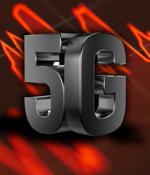Security News

The National Security Agency, the Cybersecurity and Infrastructure Security Agency, and the Office of the Director of National Intelligence, have published a joint report that highlights the most likely risks and potential threats in 5G network slicing implementations. The 5G network slicing report builds upon Potential Threat Vectors to 5G Infrastructure, a paper published last year by the Enduring Security Framework cross-sector working group focused on addressing risks and threats to the security and stability of U.S. national security systems.

In this interview with Help Net Security, Anubhav Arora, VP of Security Engineering at Cradlepoint, talks about the most common 5G security misconceptions, how to make sure the network is safe, but also how 5G can benefit businesses. There's a common misconception among security teams that 5G is only a data transport technology.

To that end, telecommunications companies, mobile network operators and other communication service providers are already taking advantage of the security controls inherited from 3G/4G. And they are now supplementing them with purpose built 5G security controls to enhance their network and service security processes, while simultaneously introducing best practices and policies to deliver the necessary resilience. "Regarding security assurance, telcos have historically relied on a priori security certification of physical components and devices, such as through Common Criteria. The 'softwarization' of network components - central to the 5G service-oriented architecture - requires much more agile ways to test security."

Current challenges and risks entailing 5G / IoT. A key differentiation between 5G and its predecessor networks is that 5G entails an untrusted core network between the subscriber end and the unified data management environment, whereas predecessor networks had a hierarchical trust model. A 2021 report by the Cybersecurity and Infrastructure Security Agency regarding Potential Threat Vectors to 5G Infrastructure listed supply chain risks as a particularly dangerous threat in the 5G space.

Cisco partnering with GDIT to provide private 5G to government agencies. Cisco has announced today that it has expanded its partnership with General Dynamics Information Technology to bring Cisco private 5G capabilities to a spectrum of government agencies.

The Government of Canada announced its intention to ban the use of Huawei and ZTE telecommunications equipment and services across the country's 5G and 4G networks. "Today, the Government of Canada is ensuring the long-term safety of our telecommunications infrastructure. As part of that, the government intends to prohibit the inclusion of Huawei and ZTE products and services in Canada's telecommunications systems," reads the announcement.

The Canadian government has joined many of its allies and banned the use of Huawei and ZTE tech in its 5G networks, as part of a new telecommunications security framework. "The Government is committed to maximizing the social and economic benefits of 5G and access to telecommunications services writ large, but not at the expense of security," stated the Government of Canada.

The global 5G in defense market reached a value of $765.2 million in 2021, and looking forward, the market is set to reach a value of $8,952. The widespread adoption of autonomous defense vehicles and robots in the defense sector is one of the key factors primarily driving the market growth.

The global 5G IoT market size was valued at $1.4 billion in 2020 and is projected to reach $111.2 billion by 2028, growing at a CAGR of 72.1% from 2021 to 2028, according to Verified Market Research. Rising demand for IoT connected devices, more adoption of mobile broadband as well as a growing device-to-device communication, and swift innovation virtualization in the networking domain is driving the growth of the 5G Technology Market.

Vodafone Portugal suffered a cyberattack causing country-wide service outages, including the disruption of 4G/5G data networks, SMS texts, and television services. The cyberattack began last night with Vodafone calling the incident "a deliberate and malicious attack intended to cause damage."